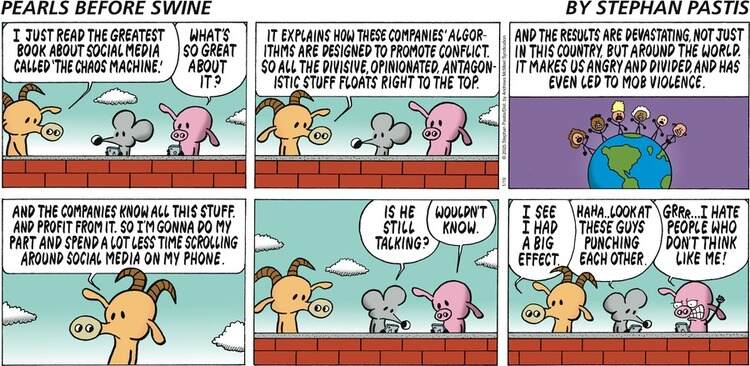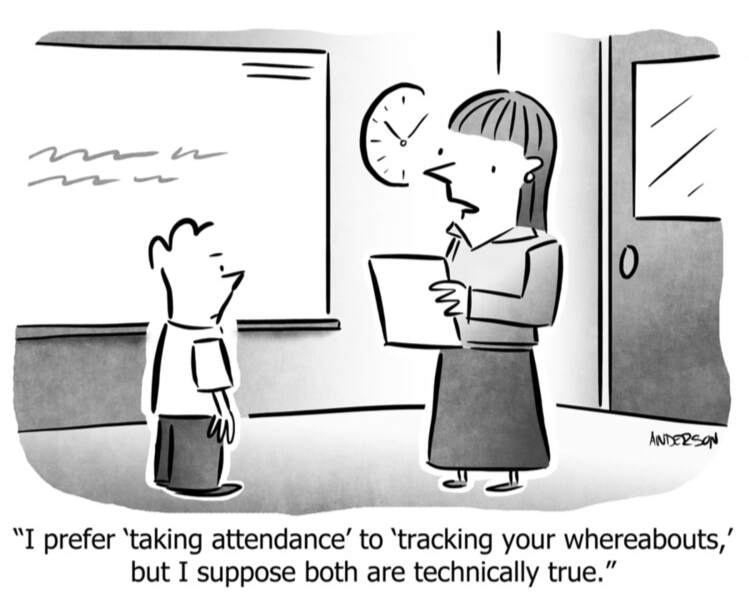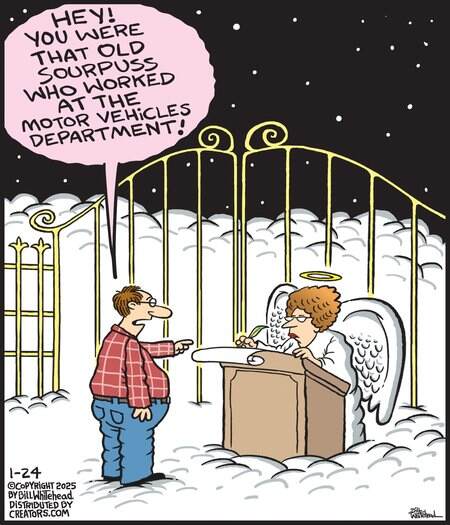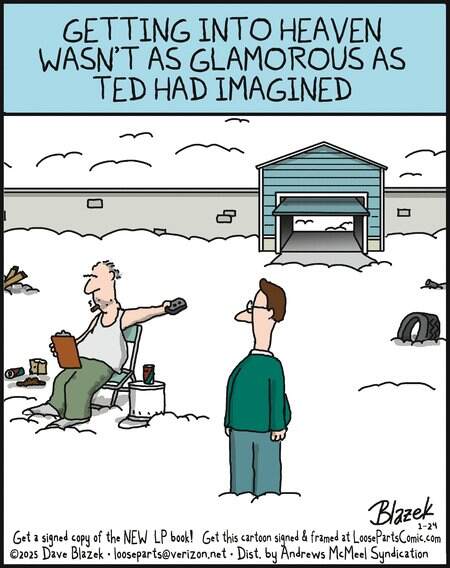CSotD: A Break in the Despair
Skip to comments
We’re in no danger of running out of frightening, stupid things to comment about, but I’m overwhelmed with funny, inventive comics, so let’s pause the existential angst. It’s not like it’s going anywhere.

Today’s Willie ‘n Ethel offers a hard truth but a bit of perspective. I’ve seen a lot of political cartoons lately about people worshipping the Golden Calf, and the importance of that story is that, for all the miracles the crowd had witnessed in their escape from Egypt, as soon as Moses left them for a little while, they freaked out and sought comfort somewhere else.
At least Moses got pissed, rather than trying to figure out how he could build a Golden Calf of his own and lure them back.

Cartoons about people staring at their phones aren’t rare, but I like Megan Herbert’s concept of crosswalks where you’d be required to look up. There was a time, long ago, when our technology ended when we left the building.
And sometimes the technology left the building. I remember, O Best Beloved, a time when television ended after the late movie. They’d play the national anthem — both the Star-Spangled Banner and O Canada where I grew up — and then you got fuzz and static for five or six hours until the station signed on again. And no VCRs.
Mostly, we slept but there was also the option of reading or just thinking about stuff.
Even when the stations were broadcasting, they were so few that often there wasn’t “anything good on.” Television executives spoke of “Least Objectionable Programming,” which meant stuff people would watch, not something they genuinely wanted to see but whatever was on that least repelled them.
In a time of half a dozen channels, the bar didn’t have to be too low. With 100 or more choices, the LOP is so deep underground that it has to look up to see the sewer pipes.

We appear to have adjusted, as shown in Pearls Before Swine (AMS). Our world is full of possibilities, but that doesn’t compel people to seek the best and brightest.
I realize all this may not seem amusing to you, but I have a dark sense of humor. When I laugh at human frailty, I expect it to be really, really frail. My grandfather used to say, “Blessed are those who expect nothing, for they shall not be disappointed.”

My grandfather — who was quite high up in the steel industry — also used to say that if his colleagues had spent the money cleaning up that they spent lobbying against the Clear Air Act, they’d have made Pittsburgh a showcase.
I doubt he’d be shocked at the scene in this Barney and Clyde (Counterpoint), except for the fact that it’s supposed to be fictional.
Juxtaposition of the Day


There really wasn’t a lot of time between when I got my first computer — a TI Pro — and the point where I could hook it up to the outside world, though without graphics. Windows wasn’t around yet and I needed a more robust machine anyway, until which time I used the computer for word processing and messaging back and forth on listservs.
But I’m hardly a digital native, and I identify with the granny at the train station, because there’s a lot of whizz-bang that I don’t have. It’s not that I can’t understand it. It’s that I don’t want it.
I’m not even that crazy about my Smartphone, and being so continuously on call reminds me of the puppy Alexander Pope gave the Prince of Wales, which bore a silver tag reading “I am His Majesty’s dog at Kew. Pray tell me, sir, whose dog are you?”
And though I’m no Luddite, I have to wonder, when boarding a plane, how fussing with your phone can possibly be easier than pulling a boarding pass from your pocket?
I think it would be nice if every night around midnight, your phone would play the national anthem and shut down for six hours. Maybe earlier.
Don’t get me wrong: Smartphones are a good invention.

So was heroin: It not only relieved headaches but cured opium addiction. Smartphones and heroin are like sports gambling or drinking and driving: You just have to be responsible, and then, hey, no problem!

This Andertoons (AMS) reminded me of a school district in Texas about 20 years ago that proposed implanting microchips in kids so they could track them. I don’t think they did it, but I don’t know whether that was because it has a horrifically terrible idea or because they realized the technology wasn’t quite there yet.
Here, however, is a guide to what you can do to put your kid under constant surveillance, though I have a better, cheaper plan: If you feel your child is in danger of being kidnapped, molested or murdered, move. Go live someplace sane. Maybe a little of that sanity will rub off on you.
I’ve seen letters in advice columns from parents who continue to track their kids in college, and they aren’t asking for help in not being paranoid and unreasonable, but about how to deal with kids who think being 18 means you can cut your own meat and wipe your own tushie.
Juxtaposition of the Day #2


To wind things up on a theological note, we have dissenting views of the afterlife. I don’t know the respective religions of the cartoonists, if they have any, but Whitehead’s view reminds me of my own Catholic upbringing, where you were expected to confess your sins regularly and it was assumed that you’d have some.
Sister told us the best possible death would be to be hit by a bus on your way out of church before you’d had a chance to sin again. With my luck, I’d spot the bus out of the corner of my eye and yell, “JFC!” and find myself at the end of a long line and having to convince that woman from the DMV that it had been a prayer.
Blazek’s view is more Evangelical: Once you’ve pledged your loyalty, you can sin all you want, knowing you’ve been pre-forgiven.
Either way, bring your phone, ’cause they’ll want to scan your QR Code.


Comments 10
Comments are closed.